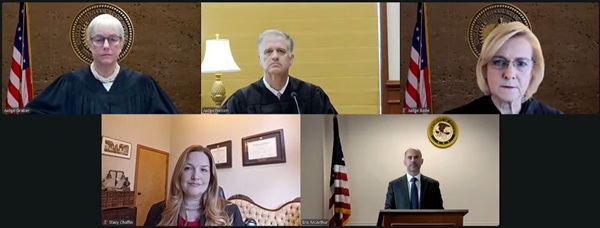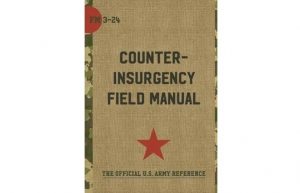9th Circuit to rehear case on troop orders to Portland
8 min read
Presenter: A three-judge panel on the 9th U.S. Circuit Court of Appeals ruled Oct. 20 that under Title 10, Section 12406, the president of the United States can send troops to protect federal property in Portland, Oregon. During oral arguments Oct. 9, one judge recalled another president sending troops to protect federal property at Fort Sumter. Judge Ryan D. Nelson:
Judge Nelson: Welcome to the 9th Circuit. Judge Bade and Judge Graber and I are glad for your timely appearance. And we know this is on a quick turnaround and we appreciate all the hard work that’s gone into it. We’re ready to proceed with argument in State of Oregon; City of Portland v. Donald J. Trump, case number 26-6268. We’ll first hear from Mr. McArthur.
[00:00:48] Eric McArthur: Thank you, Judge Nelson. And may it please the Court, Eric McArthur for the federal government.
[00:00:53] For the second time in recent months, a district court in this circuit has entered a heretofore unprecedented order enjoining the president from calling up the National Guard to protect federal personnel and property from violence aimed at thwarting federal law enforcement. And the first order was swiftly stayed by this court and this order should be swiftly stayed as well.
[00:01:21] Presenter: Judge Susan P. Graber:
[00:01:22] Judge Graber: Why is it important to know what happened in Los Angeles, Dallas, or Chicago when dealing with Oregon?
[00:01:30] Eric McArthur: So I think that is one of the key errors here that the district court judge made is taking this blinkered view of the statute, where we’re only looking at what’s happening in Portland in the days or weeks ahead of the federalization. And to your question about why is what’s going on in the rest of the country relevant, that’s because the government only has limited protective services at its disposal.
[00:01:54] A hundred and fifteen Federal Protective Services officers have been brought in from other locations and deployed to provide 24-7 protection of the Portland facility, and our declarations below explain why that is neither safe nor sustainable, that they’re not equipped to deal with that.
[00:02:12] Judge Nelson: How often does that happen where forces are reallocated like this? Is that unusual or is that regular?
[00:02:18] Eric McArthur: I don’t have historical data on this, but I have to imagine that a diversion of this magnitude is quite irregular. If you look at the declaration from the deputy director of FPS, he says quite clearly that we are not equipped to deal with this kind of ongoing sustained unrest. While the officers are expected to be able to respond to emergencies, they are not expected to work 12 hours a day, seven days a week, which has become the norm. That declaration states that is neither safe nor sustainable.
[00:02:51] And that’s, I think, something that the president can surely take into account in analyzing whether the regular forces are able to execute the laws.
[00:02:59] We first tried to manage the situation with the regular forces and the president only activated the National Guard after it became clear that that was neither safe nor sustainable. And the way the district court judge looked at this, where she refused to consider any of the evidence from June or July or earlier in the summer, and didn’t dispute that the conditions may have been met to activate the guard then, effectively penalizes the president for using the National Guard as a last resort rather than as a first resort.
[00:03:30] And if you look at paragraph 16 of the Cantu declaration, it says, ‘The situation has resulted in FPS having to rely almost exclusively on ICE special response teams for assistance in preventing the violent protesters from attacking immigration officers and the ICE facility.’
[00:03:47] And he explains that their primary mission is to be out in the field handling high-risk immigration enforcement operations. But they’re now having to be diverted to protect the facility, becoming a drain on immigration enforcement, as well. If you look at the Wamsley Declaration, paragraph 20 pages 77-78, it is to like effect.
[00:04:07] Judge Graber: My next question is regarding the third prong of the statute, and what is your view of the meaning of the phrase ‘the regular forces?’
[00:04:20] Eric McArthur: So I think the regular forces are the forces that ordinarily enforce the laws that are at issue and that the president has concluded the regular forces are unable to enforce. Here I think that would be, the officers of the Department of Homeland Security and Federal Protective Service. (There is-)
[00:04:38] Judge Nelson: Does that include local police officers as well, or only the federal officers?
[00:04:43] Eric McArthur: I do not think that would include state and local officers. They’re not charged with executing federal law. I think this is a statute that’s solely focused on the federal forces that are at the president’s disposal to execute the laws.
[00:04:57] The legal question is whether Section 12406 colorably authorizes the president to call up the National Guard when violence and threats of violence directed at federal officials and facilities has significantly impeded federal law enforcement and required an unsustainable diversion of the regular forces in order to contain it.
[00:05:20] That’s the legal question. The factual question is whether the facts of record here create a colorable basis to believe that that is the situation in Portland. And I think the answer to both of those questions is quite clearly ‘yes.’
[00:05:33] Presenter: Judge Bridgit S. Bade:
[00:05:35] Judge Bade: There’s a statement in Deputy Director Cantu’s declaration that there are 776 Federal Protective Service officers and only 497 are inspectors. So when he says 115 Federal Protective Service officers were deployed you’re saying that that means out of the 497 available to protect the federal building, which means roughly 25% of the officers available nationwide.
[00:06:05] Eric McArthur: How I understood it, Judge Bade. And I think that’s why he also said that this is just not sustainable.
[00:06:11] Stacy Chaffin: May it please the Court and counsel, Stacy Chaffin on behalf of the plaintiffs.
[00:06:15] The president’s (U.S. Code Title 10 Section) 12406 determinations are entitled to great deference, but that deference has a limit, and that limit is this case. Where the president’s determinations are untethered from reality, they cannot represent a colorable assessment of the facts within a range of honest judgment.
[00:06:33] Judge Nelson: When the president comes in and says, look, we’ve got 115 FPS forces that aren’t normally in Portland, and we’ve had to move them, this is straining our ability to execute the laws. I don’t understand how you can question the behind the scenes to say, oh no, that can’t be right.
[00:06:49] The statute says the president can’t execute the laws. That’s an internal decision-making. And whether there’s a ton of protests or low protests, they can still have an impact on his ability to execute the laws.
[00:07:04] And I’m just trying to figure out why we’re giving district courts the ability to say, ‘Well, this is what I see on the outside, so therefore I’m going to transfer that onto what’s going on behind the scenes.’ And we have declarations that say that it is impeding their ability to perform their function.
[00:07:21] Stacy Chaffin: We have declarations that say we’re short-staffed, we’re having administrative difficulties because we don’t have enough people. That is not a reason to bring the military into the streets of Portland or any other city in the United States. There needs to be something more than a deficit of employees to raise to the level of such a significant incursion into the sovereignty of a state…
[00:07:46] What we have is a history of a very expansive and almost strained reading from the government of the district court orders.
[00:07:54] Because this authorization is to protect any federal government location, federal personnel go throughout the city to execute whatever their mission is. And there’s no, as of the drafting, there’s no specific limitation that they’re going to only be in.
[00:08:10] Judge Nelson: But why would we enjoin it upfront? I mean, I want to be clear: I’m very sensitive to the slippery-slope argument that’s being made here and the slippery-slope argument that’s being made in LA and around the country. This is something that clearly the founders were concerned about. There’s been a lot of debate about how this should be used.
[00:08:28] So I’m not trying to diminish that. It may well be that the forces are used in an improper way. But we don’t have any evidence of that right now. All we have is a document that says we have a federal facility under attack, or that violence has forced it to close down and we want to protect it. That doesn’t strike me as a glaring overuse on its face.
[00:08:56] Judge Bade: The facility was forced to close. It was inoperable for almost a month and the declarations state that the facility only reopened because of a surge of 115 Federal Protective Services officers to Portland. According to the declarations that had been presented, the president relied on the facts leading up to the order, from June, July, and August and September.
[00:09:20] So there’s a period of a few months where things were unfolding on the ground. And what I think you’re saying is: We can’t consider any of that, that it should only be a few days. But what is your basis for saying that?
[00:09:31] Stacy Chaffin: The text of the statute is the basis. So if we look at the third prong, it says ‘the president is unable.’ That is a current inability to execute with the regular forces, the laws of the United States.
[00:09:45] Judge Nelson: And is that a day-by-day? So that, if we said, ‘Forces are allowed,’ and then what? We come back the next day and say, ‘Oh well, you got it under control now. Now they’re not allowed.’ Then it goes back up. ‘Oh, they’re allowed.’ I mean, it just seems like such a tortured reading of the statute.
[00:10:01] I mean, I’m not even sure President Lincoln would’ve been able to bring in forces when he did, because he’d have to wait, you know, if he didn’t do it right after, immediately after Fort Sumter, your argument would be, ‘Oh, things are okay right now.’
[00:10:15] Presenter: After the 2-1 ruling that deferred to the president, 9th Circuit judges on Oct. 28 ordered the case reheard by a larger panel, typically 11 judges.







